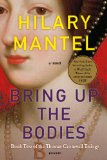Summary | Excerpt | Reading Guide | Reviews | Beyond the Book | Readalikes | Genres & Themes | Author Bio

Wolf Hall Trilogy #2
by Hilary Mantel
He reads. He writes. Something tugs at his attention. He gets up and glances from the window at the walks below. The panes are small and there is a wobble in the glass, so he has to crane his neck to get a proper view. He thinks, I could send my glaziers down, help the Seymours get a clearer idea of the world. He has a team of Hollanders who work for him at his various properties. They worked for the cardinal before him.
Henry and Jane are walking below. Henry is a massive figure and Jane is like a little jointed puppet, her head not up to the king's shoulders. A broad man, a high man, Henry dominates any room; he would do it even if God had not given him the gift of kingship.
Now Jane is behind a bush. Henry is nodding at her; he is speaking at her; he is impressing something on her, and he, Cromwell, watches, scratching his chin: is the king's head becoming bigger? Is that possible, in mid-life?
Hans will have noticed, he thinks, I'll ask him when I get back to London. Most likely I am under a mistake; probably it's just the glass.
Clouds are coming up. A heavy raindrop hits the pane; he blinks; the drop spreads, widens, trickles against the glazing bars. Jane bobs out into his sightline. Henry has her hand clamped firmly on his arm, trapping it with his other hand. He can see the king's mouth, still moving.
He resumes his seat. He reads that the builders working on the fortifications in Calais have downed tools and are demanding sixpence a day. That his new green velvet coat is coming down to Wiltshire by the next courier. That a Medici cardinal has been poisoned by his own brother. He yawns. He reads that hoarders on the Isle of Thanet are deliberately driving up the price of grain. Personally, he would hang hoarders, but the chief of them might be some little lordling who is promoting famine for fat profit, and so you have to tread carefully. Two years ago, at Southwark, seven Londoners were crushed to death in fighting for a dole of bread. It is a shame to England that the king's subjects should starve. He takes up his pen and makes a note.
Very soon – this is not a big house, you can hear everything – he hears a door below, and the king's voice, and a soft hum of solicitation around him … wet feet, Majesty? He hears Henry's heavy tread approaching, but it seems Jane has melted away without a sound. No doubt her mother and her sisters have swept her aside, to hear all the king said to her.
As Henry comes in behind him, he pushes back his chair to rise. Henry waves a hand: carry on. 'Majesty, the Muscovites have taken three hundred miles of Polish territory. They say fifty thousand men are dead.'
'Oh,' Henry says.
'I hope they spare the libraries. The scholars. There are very fine scholars in Poland.'
'Mm? I hope so too.'
He returns to his dispatches. Plague in town and city … the king is always very fearful of infection … Letters from foreign rulers, wishing to know if it is true that Henry is planning to cut off the heads of all his bishops. Certainly not, he notes, we have excellent bishops now, all of them conformable to the king's wishes, all of them recognising him as head of the church in England; besides, what an uncivil question! How dare they imply that the King of England should account for himself to any foreign power? How dare they impugn his sovereign judgement? Bishop Fisher, it is true, is dead, and Thomas More, but Henry's treatment of them, before they drove him to an extremity, was mild to a fault; if they had not evinced a traitorous stubbornness, they would be alive now, alive like you and me.
He has written a lot of these letters, since July. He doesn't sound wholly convincing, even to himself; he finds himself repeating the same points, rather than advancing the argument into new territory. He needs new phrases … Henry stumps about behind him. 'Majesty, the Imperial ambassador Chapuys asks may he ride up-country to visit your daughter, Lady Mary?'
Copyright © 2012 by Hilary Mantel




Information is the currency of democracy
Click Here to find out who said this, as well as discovering other famous literary quotes!
Your guide toexceptional books
BookBrowse seeks out and recommends the best in contemporary fiction and nonfiction—books that not only engage and entertain but also deepen our understanding of ourselves and the world around us.